Springfield Addiction and Mental Health Treatment Resources Guide
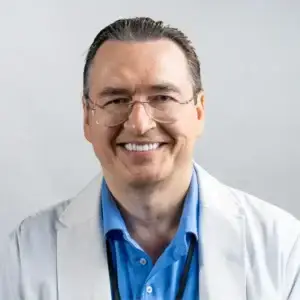
Dr. Rostislav Ignatov, MD
Chief Medical Officer
Springfield faces a serious addiction crisis that has grown sharply in recent years, disproportionately impacting Hispanic and Black residents. Between FY22 and FY23, the city saw a 37% rise in opioid-related overdose death rates—the steepest increase in the region compared to Hampden County’s 16% overall rise. Looking back further, overdose deaths in Springfield increased 55% from FY19 to FY23, underscoring the depth of the challenge.
At the same time, Springfield has built a growing recovery network. Community Behavioral Health Centers, 24/7 mobile crisis teams, medication-assisted treatment, peer support groups, culturally competent bilingual services, and sober living facilities all provide pathways to care. The Springfield Police Department has also played a direct role in saving lives, reporting over 328 rescues through Narcan administration, while the city has committed $7 million in opioid settlement funds over the next 15 years to expand treatment and prevention.
Despite these investments, access remains unequal. Hispanic residents experienced a 68% increase in overdose death rates, while Black non-Hispanic residents saw an 82% increase, even as overall community engagement and treatment admissions declined.
This guide explains how to access addiction, mental health, and recovery services in Springfield, helping residents navigate a complex but resilient treatment system.
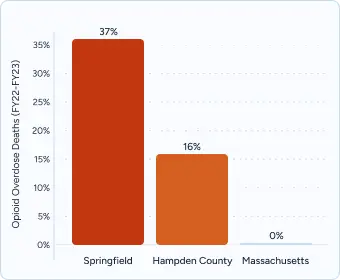
Springfield’s opioid-related overdose death rate rose
37% between FY22 and FY23, the steepest increase in the region and the highest since 2018. Hampden County overall saw a 16% rise, while the statewide Massachusetts rate showed no change during the same period.
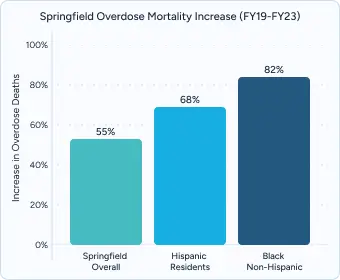
Over the past four fiscal years, Springfield has recorded a 55% increase in overdose mortality. Data also reveal sharp racial and ethnic disparities: Hispanic residents experienced a 68% increase in overdose death rates, while Black non-Hispanic residents saw an even greater
82% increase.
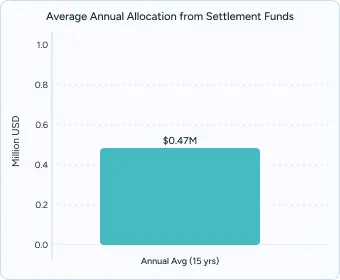
Springfield has allocated $7 million in statewide opioid settlement funding over the next 15 years. These resources are earmarked for expanding community-based services, recovery housing, and culturally competent outreach programs across the city.
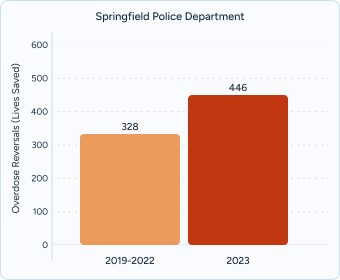
Since launching its Narcan program in 2019, the Springfield Police Department has reported hundreds of overdose reversals. By March 2022, officers had administered 328 life-saving doses, and by March 2023 the total rose to 446 rescues. The year-over-year increase underscores the central role of law enforcement and first responders in frontline overdose response.
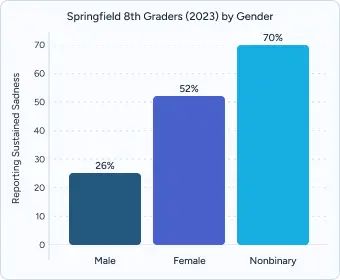
The 2023 Springfield Youth Health Survey found that more than two in five students felt sustained sadness that could indicate major depression. This marks a sharp increase from 29% in 2019, showing worsening trends over time. By comparison, 28% of Massachusetts students overall reported similar symptoms in 2023, underscoring the higher burden Springfield faces. Rates were especially high among female students (52%) and nonbinary or questioning students (70%), compared to 26% among males.
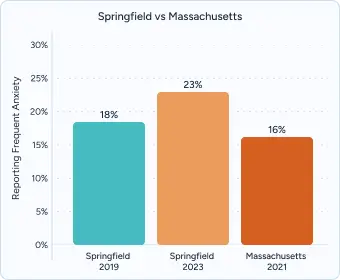
Survey data show that nearly one in four students experienced anxiety symptoms on most days, up from approximately 18% in 2019. Anxiety was disproportionately reported among students of color, LGBTQ+ youth, and those from low-income families. By comparison, the 2021 Massachusetts Youth Risk Behavior Survey found that about 16% of high school students statewide reported frequent anxiety, placing Springfield significantly above the state average.

Springfield addiction treatment centers address immediate needs across neighborhoods.
Behavioral Health Network WellBeing Center serves as a centralized access point for treatment information and referrals. The program includes 24/7 crisis services and peer specialist navigation, distributing over 1,000 Narcan kits in 2023 through community partnerships.
The Mobile Crisis Intervention team provides 24/7 crisis intervention, covering Springfield, Holyoke, Chicopee, and surrounding Hampden County communities. With locations at 417 Liberty Street and satellite offices, it offers same-day evaluation, crisis stabilization, and a 16-bed crisis stabilization program available within 60 minutes.
Transportation accessibility through Pioneer Valley Transit Authority (PVTA) links all neighborhoods to Springfield drug rehab programs and mental health facilities. The B43 line provides access to downtown treatment centers, while the B7 and B15 connect outlying areas like Forest Park and Pine Point to central services. The PVTA ADA Paratransit Service offers specialized transportation for individuals with disabilities seeking treatment.
Covers 100% of treatment costs for qualified residents, including medical detox, residential treatment, outpatient therapy, and approved medications like methadone and buprenorphine. As of 2024, copayments have been eliminated for most services, extending coverage to residents up to 138% of federal poverty level under Medicaid expansion.
MassHealth Standard and CarePlus offers coverage for eligible children and adults, ensuring access to crisis services and ongoing support. Residents can enroll via the Massachusetts Health Connector online portal or by calling (800) 841-2900, with applications available in Spanish, Portuguese, and other languages.
Massachusetts Behavioral Health Partnership (MBHP) provides state-funded financial assistance for individuals not eligible for MassHealth, up to 400% of federal poverty level. Apply through the Massachusetts Department of Public Health regional offices or online, with support materials in multiple languages including interpretation services.
Springfield Health Access Program offers wraparound funding and navigation services for uninsured residents. Visit the Caring Health Center website at caringhealth.org or call (413) 739-1100 to find public treatment slots and support resources across community agencies.
Eliminating wait times through free insurance verification and comprehensive assessment, with medical detox availability and evidence-based therapies including EMDR, family systems therapy, and mindfulness-based relapse prevention approaches.
Private facilities often provide advantages over state-funded programs including:
Insurance processing completed within 48 hours with same-day admission capabilities when clinically appropriate for qualified candidates.
The Haven Detox – New England in Worcester combines traditional therapies like CBT and DBT with holistic approaches including Reiki, art therapy, and yoga, plus cutting-edge GeneSight® genetic testing to personalize medication selection. With one of the highest staff-to-client ratios in Massachusetts, the Springfield location provides both medical detox and residential treatment in a comfortable, resort-like environment for comprehensive healing.
Comprehensive care across Forest Park, South End, and North End communities provides depression treatment, anxiety care, and dual-diagnosis support. Programs feature culturally competent care with bilingual Spanish-speaking providers and trauma-informed approaches designed for Springfield’s diverse population.
Neighborhood-specific mental health resources ensure accessibility across Springfield’s diverse communities. Forest Park programs include community clinic counseling and mobile therapy units serving predominantly Hispanic families with tailored cultural support approaches. North End services offer peer-led support circles and faith-based counseling partnerships focused on African American and Caribbean communities, integrating mental health and substance use treatment where clinically indicated.
Peer Recovery Support Centers provide free peer-led recovery support, specialized support groups, and sober social events throughout the region.
Behavioral Health Network Peer Services in Springfield (417 Liberty Street) offers free peer-led recovery support with certified peer specialists available seven days per week. Features culturally responsive groups for Spanish-speaking individuals, transit accessibility via PVTA routes, and weekend programming including social media recovery communities.
Hampden County Sheriff’s Office Recovery Coach Program in Springfield provides peer support through the Rapid Response and Connection Team with 24/7 2-hour post-overdose outreach services. Offers harm reduction resources including Narcan distribution and immediate service connection with trained recovery coaches.
Learn to Cope Western Massachusetts Chapter meets regularly throughout Springfield and surrounding areas providing peer-led support for families affected by substance use disorders. Call (508) 738-5148 for meeting schedules and location information, with both English and Spanish-speaking facilitators available.
Massachusetts Alliance for Sober Housing (MASH) certified residences maintain statewide quality standards with local directory access available through masshousing.org.
ABLE House holds MASH certification providing structured sober living with 24-hour peer support, keyless entry, community kitchen, and free Wi-Fi access. Requires weekly house meetings, chore rotation assignments, and random drug screening with 30-day minimum stay requirements for program completion.
Prospect Men’s Home maintains NARR accreditation offering individual bedrooms, secure entry system, shared common areas, and off-street parking facilities. Participation includes weekly house meetings, mandatory 12-step meeting attendance, and household responsibility sharing with $160 weekly rent and $200 security deposit.
Narcotics Anonymous and Alcoholics Anonymous meetings serve over 200 weekly gatherings with mobile app integration through the Meeting Guide app.
Spanish-speaking NA meetings serve Springfield’s Hispanic community with multiple weekly locations throughout the Forest Park and South End neighborhoods, offering culturally relevant recovery support and translational assistance. Contact Springfield Area NA Hotline for current schedules and participation literature.
LGBTQ+ affirming recovery groups in Springfield provide trauma-informed support and dual diagnosis resources, creating safe meeting spaces for LGBTQ+ individuals in recovery. Meetings occur in community centers, mental health facilities, and faith-based organizations, reinforcing inclusive recovery support networks.
Comprehensive Assessment should evaluate both substance use history and mental health conditions, recognizing co-occurring disorders affect over 50% of individuals seeking treatment. Look for integrated dual diagnosis services and family assessment interviews to understand systemic factors.
Evidence-based therapies including Cognitive Behavioral Therapy (CBT), Dialectical Behavior Therapy (DBT), and Medication-Assisted Treatment (MAT) form the foundation of effective addiction treatment. These approaches address both psychological and physiological aspects of addiction through structured therapeutic interventions.
Culturally Responsive Care ensures providers match client backgrounds through bilingual Spanish-speaking staff, LGBTQ+-affirming treatment groups, and faith-based recovery supports when requested. Springfield’s diverse population benefits from services specifically designed for Hispanic, African American, and Caribbean communities.
Aftercare Coordination connects clients with outpatient therapy, peer-led support groups, and transitional housing options through warm handoffs between providers and ongoing partnerships with community recovery organizations. Springfield’s network emphasizes maintaining therapeutic relationships across treatment levels and recovery phases.
Family Engagement and Support improves long-term outcomes through multi-family therapy sessions and educational workshops that address addiction’s impact on family systems. Spanish-language family programs and culturally tailored support groups help engage Springfield’s diverse families in the recovery process.
Springfield’s treatment network emphasizes evidence-based therapeutic approaches with ongoing professional development.
Trauma-Informed Care recognizes the high prevalence of trauma among individuals with substance use disorders, incorporating specialized therapies like EMDR and trauma-focused CBT. Programs invest in staff certification through the International Society for Traumatic Stress Studies with ongoing clinical supervision requirements.
Alumni Networks and Aftercare Support maintain long-term recovery connections through quarterly recovery celebration events and digital peer support platforms accessible through smartphones and computers. Springfield programs offer monthly alumni meetings and peer mentorship matching for sustained community engagement.
Benefits Navigation and Administrative Support includes MassHealth application assistance and sliding-scale fee consultations provided by certified benefits counselors and financial advocates. Specialized staff help coordinate insurance authorizations and connect clients with housing assistance programs throughout Hampden County.
Professional treatment represents an investment in recovery success, offering immediate access, personalized care, and comprehensive services designed to address the complex nature of addiction and mental health conditions.
Contact local treatment providers for immediate support and placement assistance.
Insurance Verification Services complete MassHealth eligibility checks within 24 hours and provide cost estimation assistance for all treatment levels. Staff handle prior authorization requirements and coordinate with insurance case managers to ensure uninterrupted coverage throughout treatment.
Assessment and Intake Procedures offer same-day comprehensive evaluations and next-day placement coordination when appropriate, featuring streamlined admission processes that minimize delays. Springfield facilities maintain open communication with referring agencies and family members to support treatment readiness and engagement.
Most Springfield programs schedule initial assessments within 48 hours, then connect you with appropriate treatment based on clinical needs and insurance coverage.
MassHealth covers medical detox, residential treatment, outpatient therapy, and medications like methadone and buprenorphine with minimal copayments for qualified members.
Yes. Behavioral Health Network and community centers offer bilingual NA/AA meetings throughout Springfield, with Spanish-speaking peer specialists and cultural liaisons available.
Several nonprofit clinics provide sliding-scale fees and MassHealth enrollment assistance; contact Caring Health Center at (413) 739-1100 for uninsured treatment options.
PVTA provides public transit to major treatment centers, with ADA paratransit services and some programs offering transportation vouchers for clients.
BHN Crisis Services operates 24/7 at (413) 301-9355, with mobile teams dispatched within one hour for mental health and substance abuse emergencies.
Yes. Learn to Cope offers family support at (508) 738-5148, and Springfield programs provide family counseling and intervention planning services.
Look for Spanish-speaking services at Caring Health Center, LGBTQ+-affirming groups through Behavioral Health Network, and faith-based recovery supports throughout various neighborhoods.
Yes. Springfield programs offer age-specific groups for 18-25 year olds, college outreach through local universities, and peer support circles designed for younger adults in early recovery.
Springfield Department of Health & Human Services. Opioid Recovery Remediation Fund (ORRF) Informational Session. Springfield, MA; April 2024. Accessed September 11, 2025. https://www.springfield-ma.gov/hhs/fileadmin/health/ORRF/Opioid_Recovery_Remediation_Fund__ORRF__Informational_Session.pdf
City of Springfield, Office of Health & Human Services. Mayor Sarno Brings Greetings at Springfield Health & Human Services Event. Springfield, MA; 2025. Accessed September 11, 2025. https://www.springfield-ma.gov/cos/news-story?cHash=511a911d6930f71ca10a5511cf3bd557&tx_news_pi1%5Baction%5D=detail&tx_news_pi1%5Bcontroller%5D=News&tx_news_pi1%5Bnews%5D=17060
Public Health Institute of Western Massachusetts. Springfield Youth Health Survey Initiative. Springfield, MA; 2023. Accessed September 11, 2025. https://www.publichealthwm.org/reports/springfield-youth-health-survey-initiative
Public Health Institute of Western Massachusetts. 2023 Springfield youth health survey data now available! Springfield, MA: Public Health Institute of Western Massachusetts; November 29, 2023. Accessed September 11, 2025. https://www.publichealthwm.org/news-events/general-news/2023-springfield-youth-health-survey-data-now-available
Massachusetts Department of Public Health. Results of the Massachusetts Youth Health Survey 2023. Boston, MA: MDPH; 2023. Accessed September 11, 2025. https://www.mass.gov/doc/results-of-the-massachusetts-youth-health-survey-2023-0/download
City of Springfield, MA. Springfield Police Department Marks Four Years in Ongoing Narcan Program. Springfield, MA; March 23, 2023. Accessed September 11, 2025. https://www.springfield-ma.gov/cos/news-story?cHash=77f3328f00eb5ae3ae34b630cbc9268c&tx_news_pi1%5Baction%5D=detail&tx_news_pi1%5Bcontroller%5D=News&tx_news_pi1%5Bnews%5D=16224
Massachusetts Executive Office of Health and Human Services. Behavioral Health Network WellBeing Center (Springfield, MA). Springfield, MA; launched January 2023. Accessed September 11, 2025. https://www.bhninc.org/wellbeing-centers
Hampden County Addiction Taskforce (HCAT). Rapid Response and Connection Team: program overview and post-overdose outreach; accessed September 11, 2025. https://hcsoma.org/hcat-3
James Paleologopoulos. “Amid decline in OD incidents in Hampden County, officials tout rapid response team connecting residents with help.” WAMC News; July 2025. Accessed September 11, 2025. https://www.wamc.org/news/2025-07-23/amid-decline-in-overdose-incidents-in-hampden-county-officials-tout-rapid-response-team-connecting-residents-with-help
Massachusetts Executive Office of Health and Human Services. Behavioral Health Network WellBeing Center (CBHC – Springfield). Springfield, MA. Accessed September 11, 2025. https://www.mass.gov/locations/behavioral-health-network-wellbeing-center-cbhc-springfield
Behavioral Health Network, Inc. Emergency Services (24/7 crisis line, Springfield, MA). Accessed September 11, 2025. https://www.bhninc.org/emergency-services
City of Springfield, MA. Mayor Sarno Brings Greetings at Springfield Health & Human Services Opioid Recovery Remediation Fund Forum. Springfield, MA; August 15, 2024. Accessed September 11, 2025. (noted the city received 9,221 naloxone kits in FY23.) https://www.springfield-ma.gov/cos/news-story?cHash=511a911d6930f71ca10a5511cf3bd557
Massachusetts Executive Office of Health and Human Services. Emergency/Crisis Services – Massachusetts Behavioral Health Help Line. Accessed September 11, 2025. https://www.mass.gov/emergencycrisis-services
Mass.gov. Where to Get Naloxone in Massachusetts: Community Naloxone Program (CNP). Accessed September 11, 2025. https://www.mass.gov/info-details/community-naloxone-program-cnp
Massachusetts Executive Office of Health and Human Services. CBHC Crisis Care – “Crisis Services, Near You”. Accessed September 11, 2025. https://www.mass.gov/cbhc-crisis-care
24/7 Support
No Commitment
100% Private
There’s no catch. Checking your insurance is simply a way to see what your plan covers — it doesn’t lock you into treatment, notify anyone, or cost you anything. You get answers upfront to decide what makes sense for you.
Protecting your privacy matters! No information or notifications are ever sent to your employer or family — whether you check your insurance online or call. Everything is handled through secure, encrypted systems that meet strict medical privacy laws. You stay in control of your information!
Luckily, most insurance policies cover treatment here. Depending on the healthcare you’ve already had this year, costs could even be zero. Instead of worrying, let’s just find out what your plan covers.
Most likely. We work with major providers like Cigna, Aetna, and United Healthcare, public insurances like Tricare and tribal plans, and even smaller plans like Surest Bind and Harvard Pilgrim. The quickest way to know for sure is to check online or call. It’s a quick, private way to understand what is covered upfront.
Verifying your insurance isn’t a commitment to start treatment — it’s simply a way to see what your options are. Knowing your coverage ahead of time helps you make more informed, confident decisions. It also helps flag a spot, so you’re able to get right in if you ever do decide you’re ready.
You need your policy number to check your specific policy online. If you want general information, just call. You likely have questions beyond insurance anyway. Reaching out now helps you figure out the right fit if or when you’re ready. You don’t have to put off the call until you’re in crisis. Calling is not scary, I promise!